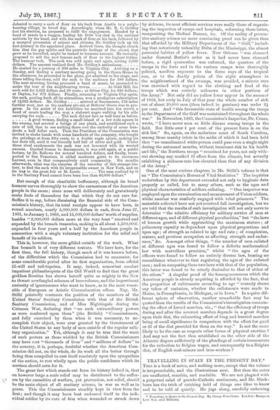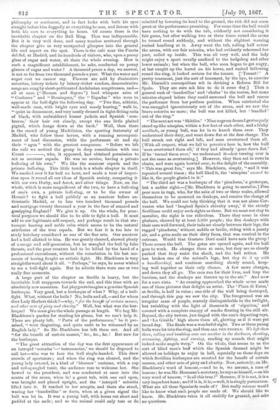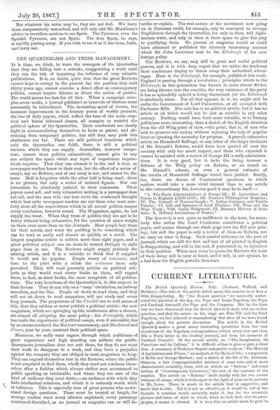TRAVELLING IN SPAIN IN THE PRESENT DAY.* THIS is a
book of notes, and nothing more, except that the volume is irreproachable, and the illustrations neat. But then the notes are unaffected, sensible, and readable. We are not plagued with a perpetual salad of pseudo-Catholic sentiments, and Mr. Black- burn has the trick of catching hold of things one likes to know and to be told of quietly. He jogs along, carefully eschewing
• Travelling in Spain in Me Present Day. By Henry Mackburn. London: Sampson Low Sin, and Blanton.
philosophy or sentiment, and in fact looks with both his eyes straight before him doggedly at everything he sees, and listens with both his ears to everything he hears. Of course there is the inevitable chapter on the Bull Ring. That was indispensable. But it is very well done, and many touches scattered through the chapter give us very unexpected glimpses into the general life and aspect on the spot. There is the cafe near the Puerta del Sol, at Madrid, and its hundreds of visitors, who, upon a penny glass of sugar and water, sit there the whole evening. How is such a magnificent establishment, he asks, conducted on penny glasses of sugar and water ? A thousand pence a day, we answer, is not so far from two thousand pounds a year. What the water and sugar cost we cannot say. Flowers are sold by diminutive sefioritas, lottery tickets by lottery-ticket vendors, demonstrative songs are sung by short-petticoated Andalusian songstresses, and— all at once (" Heenan and Sayers") loud whispers arise of Cuchares " and "Dominguez," the " Espadas " who were to appear at the bull-fight the following day. "Two fine, athletic, well-made men, with bright eyes and manly bearing," walk in, "quiet in demeanour, and very neatly dressed in tight-fitting suits of black, with embroidered hussar jackets and Spanish 'som- breros,' their hair cut closely, except the one little plaited pigtail, which hangs down at the back." Well, then there is the crowd of young Madrilefios, the sporting fraternity of Madrid, who follow these heroes, with a running accompani- ment of loud discussion, while the performers sit and sip their " agua " with the greatest composure. "Before we left the cafe we noticed the group in deep consultation with one
Count , who, it appeared, had obtained permission to act as amateur espada. He was no novice, having a private bull-ring of his own." We like the amateur espada and the private bull-ring. This little touch is a whole chapter in itself. 'We smoked over it for half an hour, and made a tour of inspec- tion upon it round all our ideas of Spanish society, comparing it with our own Derby, and Ascot, and other things. Now, on the whole, which is more magnificent of the two, to have a bull-ring of one's own, a private bull-ring, or to be the owner of Hermit ? to fight a bull publicly as an amateur before en- thusiastic Madrid, or to lose two hundred thousand pounds and mortgage twenty thousand a year in the face of amazed and gossipping England? We give it up. On the whole, for prac- tical purposes we should like to be able to fight a bull. It must add to our legitimate self-respect, and perhaps result in that sta- tuesque bearing and noble calm which seems to be the natural attributes of the true espada. But we fear it is too late to study butchery considered as one of the fine arts. Our amateur had a bull allotted to him. He was greatly cheered, showed plenty of caurage and self-possession, but he mangled the bull by false thrusts, and the poor creature had to be killed by the hand of a professional executioner, without the consolation in his last mo- menta of having fought an artistic fight. Mr. Blackburn is very straightforward about it all. "Perhaps," he says, he never wished to see a bull-fight again. But he admits there were one or two really fine moments.
A large part of the chapter on Seville is heavy, but the inevitable bull reappears towards the end, and this time with an absolutely new sensation. Let playgoers imagine a genuine Spanish burlesque. Very good, but a burlesque of what ? Why, of a bull- fight. What, without the bulls ? No, bulls and all, —and for whom does Lady Herbert think ?—why, "fur the benefit of certain masses, and other acts of piety and charity." Well, but what was the bur- lesque? We must give the whole passage at length. We beg Mr. Blackburn's pardon for stealing his plums, but we can't help it. There are plenty left. "Parts of the performance," be it pre- mised, "were disgusting, and quite unfit to be witnessed by an English lady." So Mr. Blackburn has left them out. And all "for the benefit of certain masses," &c., &c., &c. ! But now for the burlesque.
"The great attraction of the day was the first appearance of an intrepid ' sefiorita tauromauiac,' we should be disposed to call her—who was to face the bull single-handed. This drew crowds of spectators ; and when the ring was cleared, and the young lady entered, in a kind of ' bloomer ' costume, with a cap and red-spangled tunic, the audience rose to welcome her. She bowed to the president, and was conducted at once into the centre of the arena, when lo ! a great tub, with one end open, was brought and placed upright, and the ' intrepid ' sefiorita lifted into it. It reached to her armpits, and there she stood, waving her ba.nderillas ' or darts, when at a given signal the bull was let in. It was a young bull, with horns cut short and padded at the ends ; and as the animal could only toss or do
mischief by lowering its head to the ground, the risk did not seem great or the performance promising. For some time the bull would have nothing to do with the tub, evidently not considering it fair game, but after walking two or three times round the arena be turned round suddenly, and without the slightest warning rushed headlong at it. Away went the tub, rolling half across the arena, with our fair senorita, who had evidently rehearsed her part, coiled up inside. This was all very well, and the lady might enjoy a sport usually confined to the hedgehog and other lower animals ; but when the bull, who soon began to get angry, at last caught up the barrel on his horns, and rushed bellowing round the ring, it looked serious for the tenant. [' Tenant ! ' A pretty tenement, just the sort of tenement, by the bye, to exercise Mr. Disraeli's cosmopolitan wit in devising a Reform Bill for Spain. They are sure ask him to do it some day.] Than a general rush of banderillos ' and 'chubs' to the rescue, but some minutes elapsed before they could surround the bull and rescue the performer from her perilous position. When extricated she was smuggled ignominiously out of the arena, and we saw the brave sefiorita no more ; the bull was not killed, but 'bundled' out of the ring."
"The next act was 'Skittles.' 'Nine negroes dressed grotesquely stand up like ninepins, within a few feet of each other, and a frisky novillado, or young bull, was let in to knock them over. They understood their duty, and went down flat at the first charge. The bull struck out right and left, and soon overturned them all. [With all respect, what we fail to perceive here is, how the bull 'soon overturned them all,' if they had already 'gone down flat.' If he 'turned them over,' we understand it—but turning over is not the same as overturning.] However, they then sat in rows in chairs, and were again bowled over, to the delight of the assembly. "This was great fun," says Mr. Blackburn, simply, "and it was repeated several times ; the bull liked it, the ' ninepins ' seemed to like it, the people gloried in it."
"The third act was a burlesque of the 'picadores,' a grotesque, but a sadder sight.—[Mr. Blackburn is going to moralize.' Five poor men in rags, who, for the sake of two or three reales, allowed' themselves to be mounted on donkeys, and receive the charge of the bull. We could not help thinking that it was not alone Cer- vantes who had 'laughed Spain's chivalry away,' if the stately Sevillians could enjoy such sights as these. But we must not stay to moralize, the sight is too ridiculous. There they come in close phalanx, cheered by at least 5,000 people ; the five donkeys with their ears well forward, their tails set closely between their legs, the ragged 'picadores,' without saddle or bridle, riding with a jaunty air, and a grim smile on their dirty faces, that was comical in the extreme. Would that Gustave Dore could have seen the group ! There comes the bull. The gates are opened again, and the bull goes to work. He charges them at once, but they are so closely packed that they resist the shock, and the bull retires. He has broken one of the animal's legs, but they tie it up with a handkerchief, and continue marching slowly round, keep- ing well together as their only chance. A few more charges, and down they all go. The men run for their lives, and leap the barriers, and the donkeys are thrown up in the air." And now' for a rare vista. "As evening approached the whole scam made one of those pictures that delight an artist. The 'Plaza di Toros,' at Seville, is half in ruins ; one side of the wall being destroyed, and through this gap we saw the city. The foreground was an irregular mass of people, scarcely distinguishable in the twilight, but twinkling with the light of thousands of cigaritos,' and covered with a complete canopy of smoke floating in the still air. Beyond, the city towers, just tinged with the sun's departing rays, and La Giralda ' high above them all, glowing as if it were yet broad day. The finale was a wonderful sight. Two or three young bulls were let into the ring, and then ALL THE PEOPLE. We left them there, rolling and tumbling over one another in the darkness, shouting, screaming, fighting, and cursing, sending up sounds that might indeed make angels weep." On the whole, that seems to us the sort of blind man's buff which the Spanish damned might be allowed on holidays to enjoy in hell, especially on those days on which Sevillian burlesques are enacted for the benefit of certain masses, and other acts of piety and charity. Now, seriously, on Ur- Blackburn's word of honour,—and he is, we assume, a man of honour; he was Mr. Horsman's secretary, he says so himself,— on his very word of honour, "Is all this true ?" Because, if it is not, it is a
very impudent hoax ; and if it is, it it is simply portentous. What are all these Spaniards made of? But really science would like to know what such people are made of. We should like to know. Mr. Blackburn takes it all stolidly for granted, and asks no questions. But whatever his notes may be, they are not dull. We leave them comparatively untouched, and will only add Mr. Blackburn's advice to travellers anxious to see Spain. The Pyrenees, even the Spanish Pyrenees, are not Spain. The true Spain, he says, is rapidly passing away. If you wish to see it as it has been, haste, and tarry not.
































 Previous page
Previous page